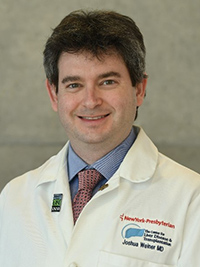Joshua Weiner, MD, is a board-certified transplant surgeon at NewYork-Presbyterian/

Dr. Joshua Weiner provides his perspective on the groundbreaking PANORAMA trial and the future of kidney transplantation.
Kidney transplant is a life saver, but we do not have enough kidneys to save all lives. There are more than 88,000 people in the United States currently waiting for kidneys – nearly 7,000 in New York alone. The demand for kidneys far exceeds the supply available, and while 8,754 kidney transplants have occurred thus far in 2023, the National Kidney Foundation estimates that 12 people die each day while waiting for a kidney transplant.
But supply is not the only issue. Even after a transplant occurs, patient and graft survival rates are limited by infection, cancer, rejection and other complications. Many of these complications are caused by the very medications that are needed to prevent rejection. Long-term immunosuppression is associated with many side-effects, such as diabetes, infections, tremors, and, ironically, kidney damage.
At NewYork-Presbyterian, we run one of the largest kidney transplant programs in the country. Over the years, our team has worked diligently to revolutionize kidney transplantation by establishing the first kidney transplant program in New York, pioneering the laparoscopic nephrectomy, and creating innovative ways to match patients with donors faster and better with paired donation, swaps, chains, and incompatible donor-recipient pairs. It is a testament to the expertise and dedication of our program in elevating transplant success.
As a transplant immunologist and surgeon, I am personally motivated to develop and implement more cutting-edge approaches that will ultimately improve patient care and health outcomes for our transplant recipients. And I am proud to be NewYork-Presbyterian/Columbia’s lead investigator on the PANORAMA trial, a clinical trial that aims to decrease the barriers to successful kidney transplantation. In January 2023, we enrolled the first patient in the world in this pivotal trial.
The PANORAMA trial is a tolerance study investigating the use of TCD601 (siplizumab) in the induction of tolerance after kidney transplantation. Tolerance means that the body accepts the transplant organ as its own without immunosuppression. This avoids both rejection and the toxic side-effects of immunosuppression. Tolerance is a game-changer.
The protocol being used in this trial is based on the work of Drs. Megan Sykes and David Sachs, faculty in Columbia’s Center for Translational Immunology. They demonstrated in animals, and later in humans, that mixing the donor and recipients’ immune systems (mixed chimerism) by combining bone marrow and kidney transplantation could lead to tolerance. However, these patients suffered from severe immunological side effects, especially chimerism transition syndrome, which could damage the newly transplanted kidney and make the patients quite sick. Our new protocol was designed to avoid these problems.
Through the PANORAMA trial, we are testing the use of siplizumab, a human anti-CD2 antibody that depletes the recipient’s T cells, especially the effector memory T cells, together with donor bone marrow to induce tolerance to kidneys from the same donor. Our objective is to see if we can reduce and/or completely stop the anti-rejection immunosuppression medications that patients normally take after transplant while avoiding chimerism transition syndrome. Reducing the use of immunosuppression post-transplant has the potential to increase transplant success and greatly improve patient quality of life by mitigating or eliminating the side effects associated with these powerful drugs. This could potentially transform the current state of kidney transplantation.
Our first PANORAMA patient has received a kidney and bone marrow from his daughter. Prior to the transplant, he first underwent an eight-day period of non-myeloablative conditioning. We intentionally did not eliminate all of the recipient’s immune system, since this would have made the recipient dangerously sick, and, rather than mixed chimerism and tolerance, the donor’s immune system would likely have attacked the recipient (this is called graft-versus-host disease and has a mortality rate of 50%).
Following non-myeloablative conditioning, the patient underwent simultaneous kidney and bone marrow transplant from the donor. Not only did we successfully achieve transient mixed chimerism, but the patient is the first in the world to do so without experiencing chimerism transition syndrome. The patient is now off all immunosuppression except for tacrolimus. Being on monotherapy five months post-transplant is novel, and we will soon begin weaning this final medication.
Since performing this initial procedure, we have successfully used this protocol on a second patient, and several more are in the process of being evaluated and enrolled. While this approach is more intensive for the recipient in the short-term, it has the potential for enormous long-term gains. It does require pre-transplant conditioning, a two-week hospital stay post-transplant, and frequent follow-ups to monitor response. However, the tradeoff is we give these individuals the chance to live a totally different life – not just receiving a new kidney but receiving a kidney and not having to take life-long medications for it. They can live a normal life. They won’t have to take pills every day. They won’t have to have the side effects of the immunosuppression. The expectation is that if they’re tolerant, they will also be able to live without really worrying about rejection.
NewYork-Presbyterian/Columbia is the only institution currently enrolling patients in this paramount trial, which has the potential to have implications not only in kidney transplantation but in organ transplantation overall. My hope is that we can complete the PANORAMA trial here at NewYork-Presbyterian/Columbia and expand it to patients who are even more genetically mismatched from their donor. This would be both personally rewarding and would have a huge impact on the field of transplantation in the future.
NewYork-Presbyterian/Columbia is a hospital where we don’t just go with what’s normally done. When patients come here, they know that if there is a new or better way of doing things, we are doing it. When a patient comes to here for an organ transplant, they don’t just get a new organ – they get a better life.



